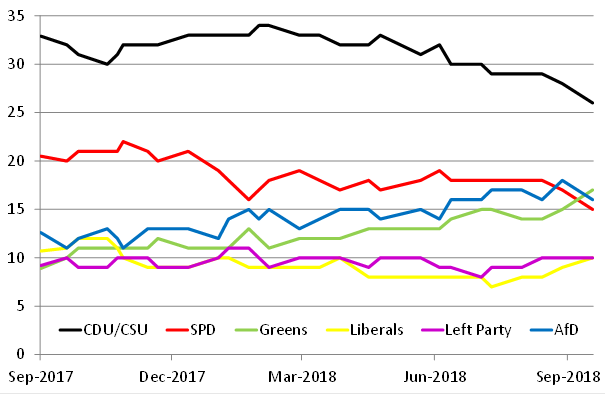The state election in Bavaria this past weekend didn’t go well for Germany’s once-dominant parties.
The center-right CSU and the centre-left SPD each lost over ten percentage points.
Down by 10.5 points to 37.2%, support for the once dominant CSU has plunged to its lowest level since 1950.
However, the losses for the CSU were less bad than the prior opinion polls which had projected a 33-35% result.
If the state election in Hesse on October 28th, where Merkel’s CDU is on the ballot, also yields a result for the center-right that is not worse than current opinion polls, Merkel will likely not face
a direct challenge from within her own CDU.
The real risk to watch stems from the SPD
Down 10.9 points to a mere 9.7% in Bavaria, the party seems to be in disarray. There is a risk that the SPD may leave the Berlin coalition. Such a move could potentially trigger the fall of Merkel and/or new elections.
Roughly in line with opinion polls, the Greens (17.5%) were the key winners of the Bavarian vote, coming far ahead of the right-wing AfD (10.2%).
Interestingly, the AfD’s tally fell short of the 12.4% of the votes they had garnered in Bavaria at the federal election last September.
One reason for that is the strong showing of a regional center-right group of “unaligned voters” (11.6%) who offer a more respectable alternative to the CSU on the Bavarian state level.
Bavaria itself will probably be ruled by a coalition of the CSU and these “unaligned voters.” If so, policies in Bavaria would not shift in a way that would be relevant for markets or the federal level in Germany.
The trends seen in Bavaria — center-right CDU/CSU and center-left SPD down, center-left and staunchly pro-European Greens up by more than the right-wing AfD — are roughly in line with pan-German opinion polls since the last federal election in September (see chart below).
Support for political parties in %, starting point is the September 2017 election result. Source: ARD Deutschlandtrend
Whether the parties backing Merkel can arrest the erosion of their support will critically hinge on one issue: Can they stop their noisy disputes that are putting off many voters? Nervous as they are, they may find that difficult.
Therefore, German politics may remain noisy for a while. A significant change in policies is not on the cards, though.
Even a hypothetical change in coalition in Berlin, say from CDU/CSU-SPD to CDU/CSU-Greens-FDP or a change at the very top from Merkel to somebody else from the CDU would not cause a major policy shift.
On key issues such as foreign policy and European affairs, all mainstream parties are fairly close.
*Chief economist at Berenberg Bank in London




